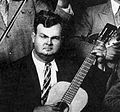This article needs additional citations for verification .(April 2021) |
"Ragged But Right" [1] is a traditional American song dating from the early 1900s. [2] It was recorded by George Jones and released in 1956 as "I'm Ragged But I'm Right". [3] The song is considered one of Jones' best early works, and it was included on his debut 1957 album (as "Ragged But Right"). [4]
